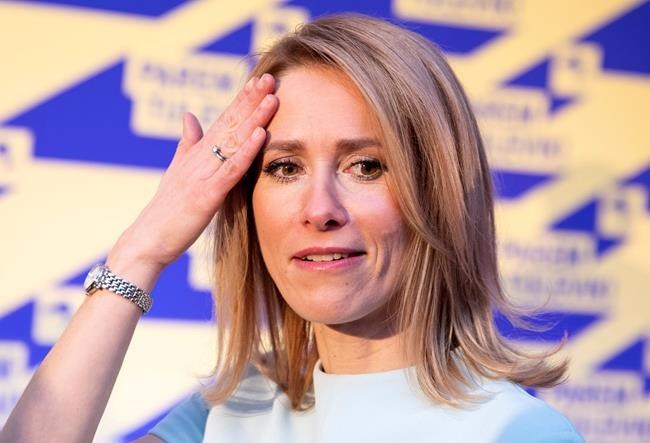
Kaja Kallas, leader of the Reform Party party gestures at her party headquarters after parliamentary elections in Tallinn, Estonia, early Monday, March 4, 2019. The rival Reform and Center parties, the two main political groupings since Estonia regained independence amid the collapse of the Soviet Union in 1991, shared an election goal of keeping EKRE from making inroads. (AP Photo/Raul Mee)
Republished March 04, 2019 - 3:52 AM
Original Publication Date March 04, 2019 - 1:51 AM
TALLINN, Estonia - Estonia faces complex coalition talks Monday after a nationalist and anti-immigration party more than doubled its support to finish third in the general election — a result being closely watched across Europe as a sign of surging popularity for far-right populists.
The centre-right Reform Party, which is the main opposition in the Baltic country's outgoing parliament, won the most votes in Sunday's election but nowhere near a majority. It has ruled out any deal with the far-right Estonian Conservative People's Party, known as EKRE, which more than doubled its seat tally compared to the 2015 election.
With European Parliament elections due in May, many political observers on the continent had looked at the Estonia vote as a barometer as to whether the far right would continue to make gains.
Martin Helme, who heads the EKRE along with his father, said he sees the party's gains as part of a trend in Europe and other parts of the world.
"I think Estonia is no different than almost all other countries in Europe, where there's a serious public demand for political parties who will stand up against the globalist agenda and the ever-increasing movement of power from (European Union) member states to Brussels," he said.
From Poland and Hungary to France and Italy, Europe has in recent months seen an increase in support for populist parties that often have a nationalist agenda.
Last year, an election in neighbouring Latvia showed strong support for pro-Russia and populist factions to become the second- and third-largest in the Baltic country.
The outcome of Estonia's elections bears similarities with what happened in Sweden across the Baltic Sea. There, the Sweden Democrats which has neo-Nazi roots, became the third largest party after making great strides in the Sept. 9 national election.
But none of the other Swedish parties wanted to have them in any government, sparking four months of a political deadlock that ended in January with a two-party, centre-left minority governing coalition headed by the Social Democrats — the country's largest political group.
In Estonia, Reform leader Kaja Kallas is expected to be tasked to form the Cabinet and emerge as the country's first female prime minister after her party finished with 28.8 per cent of the vote.
Prime Minister Juri Ratas' Center Party garnered 23.1 per cent, and EKRE ended up with 19 seats in the 101-seat Riigikogu legislature after grabbing 17.8 per cent of the vote. By comparison, the party won seven seats with 8.1 per cent four years ago.
Kallas, if she is tasked with forming a government, has a number of options to consider.
Observers say the most likely scenario is that Kallas will ask the Social Democrats and the conservative Fatherland — two junior partners in the current Cabinet — to join Reform.
Kallas took over the reins as Reform Party chairwoman only last year. The party had struggled with an internal crisis and weak leadership since losing the prime minister's post in November 2016.
Kallas is the daughter of Siim Kallas, one of the Reform Party's creators in the early 1990s and a former prime minister.
Estonia has a population of 1.3 million, and nearly 1 million voters were eligible to elect parliamentary representatives to four-year terms. Turnout was 63.1 per cent, according to preliminary figures, which is slightly lower than the 2015 election.
The country, which joined the EU and NATO in 2004, also borders Russia and is known for its tech startups.
___
Jan M. Olsen contributed to this report from Copenhagen, Denmark.
News from © The Associated Press, 2019